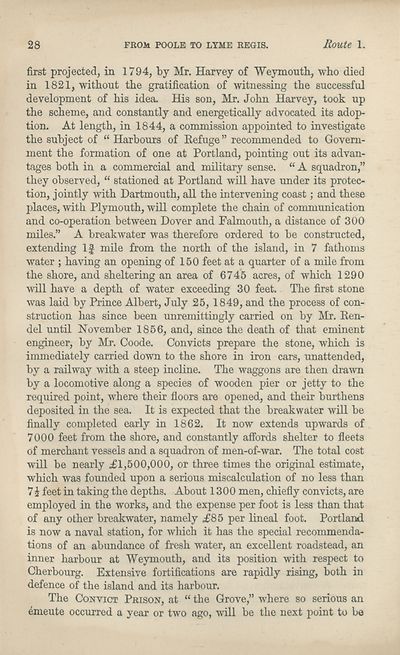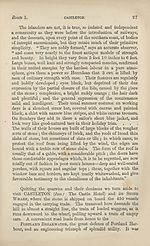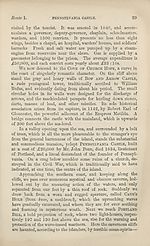Download files
Complete book:
Individual page:
Thumbnail gallery: Grid view | List view

FROM. POOLE TO LYME REGIS.
Route 1.
first projected, in 1794, by Mr. Harvey of ‘Weymouth, who died
in 1821, without the gratification of witnessing the successful
development of his idea. His son, Mr. John Harvey, took up
the scheme, and constantly and energetically advocated its adop¬
tion. At length, in 1844, a commission appointed to investigate
the subject of “ Harbours of Refuge ” recommended to Govern¬
ment the formation of one at Portland, pointing out its advan¬
tages both in a commercial and military sense. “A squadron,”
they observed, “ stationed at Portland will have under its protec¬
tion, jointly with Dartmouth, all the intervening coast; and these
places, with Plymouth, will complete the chain of communication
and co-operation between Dover and Falmouth, a distance of 300
miles.” A breakwater was therefore ordered to be constructed,
extending If mile from the north of the island, in 7 fathoms
water ; having an opening of 150 feet at a quarter of a mile from
the shore, and sheltering an area of 6745 acres, of which 1290
will have a depth of water exceeding 30 feet. The first stone
was laid by Prince Albert, July 25, 1849, and the process of con¬
struction has since been unremittingly carried on by Mr. Ren-
del until November 1856, and, since the death of that eminent
engineer, by Mr. Goode. Convicts prepare the stone, which is
immediately carried down to the shore in iron cars, unattended,
by a railway with a steep incline. The waggons are then drawn
by a locomotive along a species of wooden pier or jetty to the
required point, where their floors are opened, and their burthens
deposited in the sea. It is expected that the breakwater will be
finally completed early in 1862. It now extends upwards of
7000 feet from the shore, and constantly affords shelter to fleets
of merchant vessels and a squadron of men-of-war. The total cost
will be nearly £1,500,000, or three times the original estimate,
which was founded upon a serious miscalculation of no less than
7 i feet in taking the depths. About 1300 men, chiefly convicts, axe
employed in the works, and the expense per foot is less than that
of any other breakwater, namely £85 per lineal foot. Portland
is now a naval station, for which it has the special recommenda¬
tions of an abundance of fresh water, an excellent roadstead, an
inner harbour at Weymouth, and its position with respect to
Cherbourg. Extensive fortifications are rapidly rising, both in
defence of the island and its harbour.
The Convict Prison, at “ the Grove,” where so serious an
emeute occurred a year or two ago, will be the next point to be
Route 1.
first projected, in 1794, by Mr. Harvey of ‘Weymouth, who died
in 1821, without the gratification of witnessing the successful
development of his idea. His son, Mr. John Harvey, took up
the scheme, and constantly and energetically advocated its adop¬
tion. At length, in 1844, a commission appointed to investigate
the subject of “ Harbours of Refuge ” recommended to Govern¬
ment the formation of one at Portland, pointing out its advan¬
tages both in a commercial and military sense. “A squadron,”
they observed, “ stationed at Portland will have under its protec¬
tion, jointly with Dartmouth, all the intervening coast; and these
places, with Plymouth, will complete the chain of communication
and co-operation between Dover and Falmouth, a distance of 300
miles.” A breakwater was therefore ordered to be constructed,
extending If mile from the north of the island, in 7 fathoms
water ; having an opening of 150 feet at a quarter of a mile from
the shore, and sheltering an area of 6745 acres, of which 1290
will have a depth of water exceeding 30 feet. The first stone
was laid by Prince Albert, July 25, 1849, and the process of con¬
struction has since been unremittingly carried on by Mr. Ren-
del until November 1856, and, since the death of that eminent
engineer, by Mr. Goode. Convicts prepare the stone, which is
immediately carried down to the shore in iron cars, unattended,
by a railway with a steep incline. The waggons are then drawn
by a locomotive along a species of wooden pier or jetty to the
required point, where their floors are opened, and their burthens
deposited in the sea. It is expected that the breakwater will be
finally completed early in 1862. It now extends upwards of
7000 feet from the shore, and constantly affords shelter to fleets
of merchant vessels and a squadron of men-of-war. The total cost
will be nearly £1,500,000, or three times the original estimate,
which was founded upon a serious miscalculation of no less than
7 i feet in taking the depths. About 1300 men, chiefly convicts, axe
employed in the works, and the expense per foot is less than that
of any other breakwater, namely £85 per lineal foot. Portland
is now a naval station, for which it has the special recommenda¬
tions of an abundance of fresh water, an excellent roadstead, an
inner harbour at Weymouth, and its position with respect to
Cherbourg. Extensive fortifications are rapidly rising, both in
defence of the island and its harbour.
The Convict Prison, at “ the Grove,” where so serious an
emeute occurred a year or two ago, will be the next point to be
Set display mode to:
![]() Universal Viewer |
Universal Viewer | ![]() Mirador |
Large image | Transcription
Mirador |
Large image | Transcription
| Antiquarian books of Scotland > Adventure and adventurers > Black's guide to Dorsetshire > (44) |
|---|
| Permanent URL | https://digital.nls.uk/116814440 |
|---|
| Description | Thousands of printed books from the Antiquarian Books of Scotland collection which dates from 1641 to the 1980s. The collection consists of 14,800 books which were published in Scotland or have a Scottish connection, e.g. through the author, printer or owner. Subjects covered include sport, education, diseases, adventure, occupations, Jacobites, politics and religion. Among the 29 languages represented are English, Gaelic, Italian, French, Russian and Swedish. |
|---|

